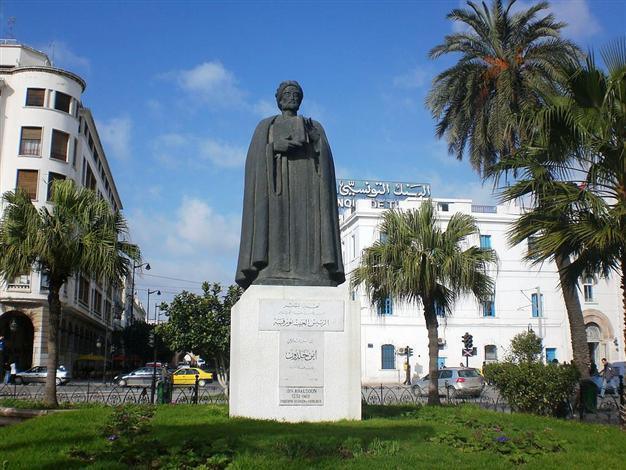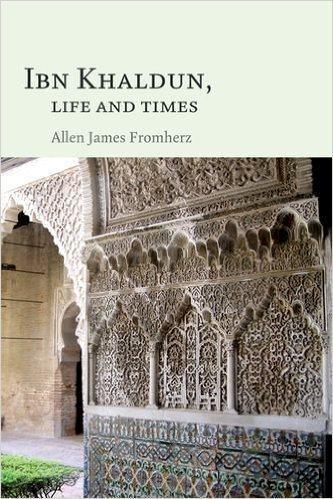Ibn Khaldun, life and times
William Armstrong - william.armstrong@hdn.com.tr

A statue of Ibn Khaldun stands in central Tunis. Source: Wikimedia Commons
‘Ibn Khaldun, Life and Times’ by Allen James Fromherz (Edinburgh University Press, 208 pages, £20)Ibn Khaldun has plenty of modern fans. The 14th century Muslim polymath is constantly invoked by writers both academic and popular, who describe him as a “man ahead of his time” or a unique “modern mind” orphaned in medieval North Africa. Ernest Gellner, one of the most influential intellectuals of the 20th century, used Ibn Khaldun’s ideas as one of his primary inspirations, while Arnold Toynbee called him the greatest historian of all time. Ibn Khaldun is today cited to make points about anything from contemporary Turkish politics to the benefits of the free market.
 This book by U.S. professor Allen James Fromherz tries to push back against some of the more simplistic contemporary adoption of Ibn Khaldun. It frames his highly original ideas in the context of the turbulent historical and personal circumstances in which he found himself in 14th century North Africa and Andalusia. This, Fromherz suggests, is a more reliable guide to his work than trying to shoehorn him into modern-day concerns: “The temptation to identify Ibn Khaldun as a modern mind ignores the direct relationship between his times and his thought.”
This book by U.S. professor Allen James Fromherz tries to push back against some of the more simplistic contemporary adoption of Ibn Khaldun. It frames his highly original ideas in the context of the turbulent historical and personal circumstances in which he found himself in 14th century North Africa and Andalusia. This, Fromherz suggests, is a more reliable guide to his work than trying to shoehorn him into modern-day concerns: “The temptation to identify Ibn Khaldun as a modern mind ignores the direct relationship between his times and his thought.” Today, by far the best-known of Ibn Khaldun’s theories is his view of the cyclical process of history, described in the “Muqaddimah,” his multi-volume tract that sought to explain why societies rise and wane. Ibn Khaldun saw history as dominated by cycles of rise and fall of dynastic power and tribal rebellion. In his view, all dynasties are inevitably doomed to destruction at the hands of new tribes within five generations, as their city-based rulers become ever more distanced from their people. Gradually adopting the ways of the old elites, they are unable to sustain the “asabiyya,” or group feeling, that is necessary to maintain authority. Dynasties come in like wolves from the desert and end like lambs in the city.
It was a very bleak vision. In the words of Fromherz, “Ibn Khaldun did not believe in an ideal Atlantis or the progress of human history. In every rise of a dynasty were the seeds of its decline in decadence.” But how does this dark perspective apply to Ibn Khaldun’s own life? He was born in Tunis in 1322 to an upper-class Arab family originally from Muslim Spain. By the 14th century, the Muslim world had entered a period of disintegration after the last Abbasid caliph was killed in Baghdad in 1258. There was no longer a center of gravity in the Muslim world. In Spain, Christian forces had long been pushing south to drive the Muslim presence back, and across North Africa numerous courts vied for regional authority. Against this backdrop, Ibn Khaldun offered his services to various patrons and administrators, pinballing from one dynasty to the next.
In Fromherz’s account, the instability of his life and times shaped Ibn Khaldun’s work. The Muqaddimah reflected the cold reality of a turbulent age besieged by disease, disunity, and instability. Ibn Khaldun was working in a cut-throat world of political disintegration, unpredictability and pestilence, where political fortunes were in constant flux. He made his fair share of enemies and spent plenty of time in prison; it was quite an achievement that he managed to live for as long as he did.
Ibn Khaldun’s life was also marked by an extraordinary amount of tragedy. Specifically, Fromherz cites the Black Death, which ripped through the Mediterranean around 1348-49, as perhaps the key event shaping Ibn Khaldun’s ideas. The plague killed both of his parents and ravaged societies across North Africa, thrusting Ibn Khaldun into the reality of events. Here, the book sometimes steps beyond the scholarly into the speculative. At one point Fromherz claims that “losing his wife and children in a shipwreck brought an end to [Ibn Khaldun’s] work as a judge upon the realization of ‘the impossibility of finding justice.’” Elsewhere, he says that Ibn Khaldun’s “autobiography and even the tone of the Muqaddim was tinted by a mood or disposition of solitude brought about by the loss of family.” This kind of oversimplification jars in an otherwise academic book. Despite such attempts at popularization, Fromherz seems unsure of his book’s intended audience, and it ends up falling somewhere between the academic and the general. Although space is obviously limited, the author also fails to address any of Ibn Khaldun’s wide-ranging works other than the Muqaddimah.
Fromherz’s central point is watertight: Ibn Khaldun is most accurately understood within the context of his own time. But still there can be little doubt that his work resounds in today’s fragile world. As Fromherz admits, “issues of the 14th century discussed in the Muqaddimah - political disunity, plague, tribal rebellion and the radical power of religious inspiration - are issues that continue to resonate today.”










